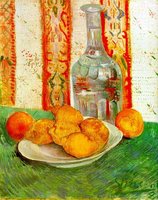Στήν Υγειά Μας
 I got a special treat this Thanksgiving. No, not that kind of treat…
I got a special treat this Thanksgiving. No, not that kind of treat… Joe (my partner) and I had a lovely dinner with my parents up in Lynn, Massachusetts, and then paid a quick visit to Pine Grove Cemetery to pay homage to my forebears who, like the Pilgrims, traveled from faraway lands to make a new life for themselves in America. Going to the cemetery may seem like an odd thing to do on Thanksgiving, but we Greeks are pretty scrupulous about visiting our ancestral gravesites, and my father wanted me to see the holiday “blanket” he had placed on his parents’ grave and also show me that the two overgrown shrubs on the sides of my maternal grandparents’ headstone had finally been cut down. It was dusk when we arrived, and the setting sun filtered through the trees gave the place a soft silvery glow. In spite of the coldness in the air, the atmosphere was pleasant and peaceful. Pine Grove was established in the mid 19th century as part of the rural cemetery movement, and its 82 acres consist of rolling hills, a wide variety of mature trees, and many splendid Victorian monuments.
After our trip to the cemetery, my mother asked us to play a little music while she cleared the table, since we had brought our instruments (my sandouri and Joe’s guitar to accompany me). Perhaps it was the music that reminded her, but after she had finished cleaning up she offered us a digestivo, and she began to rattle off a list of candidate liqueurs that contained, to my surprise, my grandfather’s raki. I was surprised, not because my mother was offering me raki, but because prior to today I had no idea that my mother possessed a secret stash of her father’s moonshine.
Raki (or rakı) is how the Turks refer to ouzo (ούζο). Both are terms for the anise-flavored liqueur consumed throughout the Mediterranean, known as “arak” in the Arabic-speaking world and “rakija” in the Balkans; in Greece, raki has often been used as a generic term to refer to homemade moonshine of all varieties. In places like Lesbos, where my maternal grandparents came from, ouzo and raki were often used interchangeably because as recently as World War I, Greeks and Turks lived side by side there. Where my grandfather learned to make raki is a family mystery, but Lesbos has historically been a major center of ouzo production. Lesbos today remains the ouzo capital of the Aegean.
My maternal grandfather died in 1963, many years before his youngest daughter (my mother) gave birth to his final grandchild (me). I have heard many stories about the homemade moonshine that he produced with a makeshift still in the basement of the house where my mother grew up, a house that stands, incidentally, across the street from the Greek Orthodox church the family attended. The priest who served there in those days knew all about my grandfather’s moonshine and was a frequent guest at my grandparents’ house.
 My mother can still remember coming home to stinging eyes when my grandfather was at work in the basement making raki. She also remembers many of the local Greeks coming to the back door with empty bottles to have them filled. As my grandfather neared the end of his life, the basement still produced less and less, which means that the small cordial glass my mother served me contained raki that was probably at least fifty years old.
My mother can still remember coming home to stinging eyes when my grandfather was at work in the basement making raki. She also remembers many of the local Greeks coming to the back door with empty bottles to have them filled. As my grandfather neared the end of his life, the basement still produced less and less, which means that the small cordial glass my mother served me contained raki that was probably at least fifty years old. As I sat in the kitchen sipping it, with its earthy and distinctly homemade flavor, I thought of the man I never knew and wondered what he would think of his gay μερακλής of a grandson who plays the sandouri (much beloved by my grandfather) and who, everyone agrees, is in many ways the most like my grandfather of all the grandchildren. Perhaps he would have mixed feelings about me. I know one thing for certain; we would have discussed our differences over a glass of raki.
The gentleman pictured is my grandfather in 1920. Above him is Vincent van Gogh’s (1853-1890) Still Life with Decanter and Lemons on a Plate (1887, oil on canvas, Van Gogh Museum, Amsterdam).
Στήν Υγειά Μας (stin hygeia mas): a Greek toast meaning, “to our health.”
μερακλής (meraklis): a person who is passionate; a bon vivant.












1 Comments:
I know it comes across in other posts (I'm reading from post 1 forward), but especially in this one:
You have such a command of descriptive. I feel engaged on so many sensory and emotional levels.
Post a Comment
<< Home